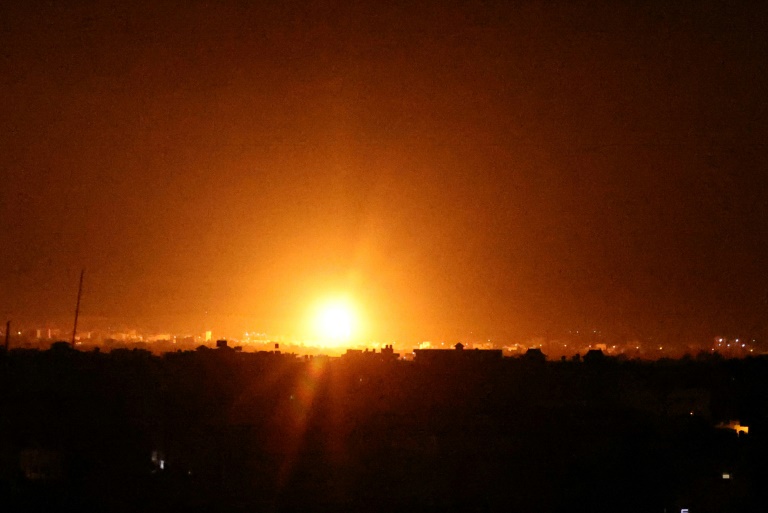Israel carried out strikes on Gaza early Wednesday after Palestinian militants sent incendiary balloons into the south of the country, the first flare-up since a major conflict killed hundreds last month.
Tensions later rose again in the occupied West Bank, where the Israeli army said they shot a Palestinian woman, alleging she had attempted to ram soldiers with a car and then stab them.
The strikes on the Palestinian enclave of Gaza were the first under the new coalition government headed by Naftali Bennett, who took over on Sunday after ousting longtime prime minister Benjamin Netanyahu.
The renewed violence came a day after more than a thousand Jewish ultranationalist demonstrators bearing Israeli flags poured into Jerusalem’s flashpoint Old City, with scores of police deployed and international monitors urging calm.
According to Palestinian sources, the Israeli air force targeted at least one site east of Khan Yunis, in the south of the Gaza Strip.
The Israeli military said that in response to “arson balloons”, its “fighter jets struck military compounds belonging to the Hamas terror organisation”.
– ‘Prepared for any scenario’ –
It said “facilities and meeting sites for terror operatives” in Khan Yunis were targeted. There was no indication of any casualties.
Israel’s military added that it was “prepared for any scenario, including a resumption of hostilities, in the face of continuing terror activities from the Gaza Strip.”
Israeli firefighters on Wednesday afternoon said they were battling to put out “several fires around the Gaza Strip… started by incendiary balloons”.
The violence is the first flare-up between Israel and Palestinian militants since a ceasefire took effect on May 21, ending 11 days of heavy fighting that killed 260 Palestinians including some fighters, according to Gaza authorities.
In Israel, 13 people were killed, including a soldier, by rockets and missiles fired from Gaza, the police and army said.
– West Bank shooting –
In the West Bank on Wednesday, a Palestinian woman was shot after attempting to drive into Israeli soldiers in a car and attack them with a knife, the military said.
The Palestinian health ministry said the woman died of her wounds.
The incident took place near Hizma, south of Ramallah. Official Palestinian news website Wafa identified the woman as Mai Afana, 29, from the town of Abu Dis, just outside Jerusalem.
But her uncle Hani Afana told AFP the family rejected the claim that the young mother had tried to kill Israeli soldiers, saying she “took this road by mistake,” and that she “did not attempt to carry out an attack”.
The previous day saw more than a thousand Israelis take to the streets of annexed east Jerusalem in a delayed and controversial march by nationalist and far-right activists.
Both the United Nations and the United States had called for restraint before the march, which Bennett’s new government authorised.
– ‘Provocation’ –
The so-called March of the Flags celebrates the anniversary of the city’s “reunification” after Israel captured east Jerusalem from Jordan in 1967 and annexed it, a move not recognised by most of the international community.
With tensions high, Israeli police were deployed in numbers for the delayed March, blocking roads and firing stun grenades and foam-tipped bullets to disperse Palestinians from the route.
Medics said 33 Palestinians were wounded. Police said two officers were injured and 17 people arrested.
The march triggered protests in the West Bank and Gaza Strip, and prompted rebukes and warnings from Israel’s allies.
Throngs of mostly young religious men sang, danced and waved flags at the Damascus Gate entrance to the Old City, which was cleared of its usual Palestinian crowds.
Some chanted “Death to Arabs” before others persuaded them to stop.
The march came just two days after Netanyahu was ousted following 12 straight years in power, toppled by an ideologically divided coalition including, for the first time in Israel’s history, an Arab party.
Bennett is himself a Jewish nationalist, but Netanyahu’s allies accused the new premier of treachery for allying with Arabs and the left.
Yair Lapid, the architect of the new government, tweeted he believed the march had to be allowed, but that “it’s inconceivable how you can hold an Israeli flag and shout, ‘Death to Arabs’ at the same time.”
Mansour Abbas, whose Islamic conservative party Raam is vital to the new coalition, called Tuesday’s march a “provocation” that should have been cancelled.
Morocco’s King Mohammed VI on Wednesday sent Bennett a letter of “warm congratulations” for becoming prime minister, before the new premier called Rabat an “important friend and partner” in return.
Morocco last year agreed to normalise ties with Israel — one of four Arab nations to do so under a Washington-backed deal — in a move condemned by the Palestinians as a “stab in the back”.










